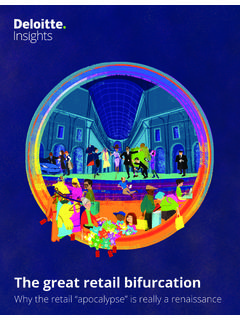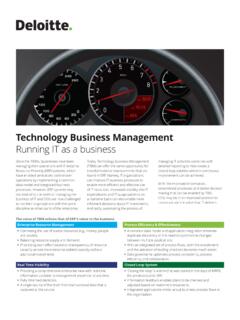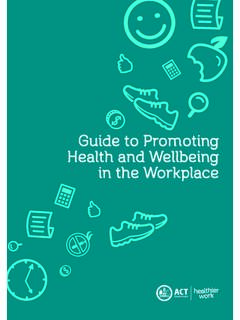Transcription of At a tipping point? Workplace mental health and wellbeing
1 At a tipping point? Workplace mental health and wellbeingMarc h 2017 ContentsForeword 01 Introductory letter 02 Executive Summary 03 The importance of mental health and wellbeing in the workforce 04 The trends driving interest in Workplace mental health and wellbeing 10 Challenges in improving Workplace mental health and wellbeing 14 Collective actions for stakeholders 20 Endnotes 28 Contacts
2 32 The Deloitte Centre for health SolutionsThe Deloitte UK Centre for health Solutions is the research arm of Deloitte LLP s healthcare and life sciences practices. Our goal is to identify emerging trends, challenges, opportunities and examples of good practice, based on primary and secondary research and rigorous analysis. The Centre's team of researchers seeks to be a trusted source of relevant, timely, and reliable insights that encourage collaboration across the health value chain, connecting the public and private sectors, health providers and purchasers, patients and aim is to bring you unique perspectives to support you in the role you play in driving better health outcomes, sustaining a strong health economy and enhancing the reputation of our industry.
3 In this publication, references to Deloitte are references to Deloitte LLP, the UK member firm of to Deloitte s report: At a tipping point? Workplace mental health and awareness of the importance of good Workplace mental health and wellbeing is growing, as is the moral, societal and business case for improving it. Yet, despite this, many employers experience numerous challenges in improving their performance in supporting employee mental health and wellbeing . Our report is designed as a call to action for employers, whatever their current position, as well as a practical guide on how to address some of the main barriers to number of recent developments are helping to raise the profile of these important issues, including the publication of Business in the Community s National Employee mental wellbeing Survey and mental health toolkit for employers in late 2016; the Prime Minister s January 2017 announcement of an independent report on companies actions to support mental health ; and Mind s first Workplace wellbeing Index.
4 The impetus for this report was The insight we gained in working with one of our charity partners, the mental health charity Mind, and its Workplace wellbeing team. Further insights were provided by working on a number of key projects on both mental and physical health in the Workplace ; including projects with occupational and corporate health providers over the past five years. This experience has given us a broad and differentiated perspective on the importance of Workplace mental health and wellbeing . Interviews with employers undertaken over a number of years suggest that employer and employee attitudes to mental health are changing. We believe we are on the cusp of a change similar to that seen with the corporate responsibility movement in the mid-1990s when momentum gathered pace, such that by the early 2000s corporate responsibility reporting had become report presents our views on: the importance of mental health in the Workplace the changing environment for Workplace wellbeing the challenges in implementation and in changing employer and employee attitudes solutions to current and future hope that you find the research insights informative, thought-provoking and of practical help for employers seeking to play a greater role in supporting the mental health and wellbeing of their employees.
5 As always we welcome your feedback and Taylor Elizabeth HampsonDirector, Centre for health Solutions Senior Manager, Monitor DeloitteForeword01At a tipping point? | Workplace mental health and wellbeingEmma Mamo, Head of Workplace wellbeing , MindOver the past few years, employee wellbeing has been rising up the agenda for employers in the UK. A key aspect of this is the mental health of staff. Organisations depend on having a healthy and productive workforce: we know that when employees feel their work is meaningful and they are valued and supported, they tend to have higher wellbeing levels, be more committed to the organisation s goals and perform better. We appreciate the work that Deloitte has done to support Mind and other organisations to promote this agenda including producing this joined Mind in 2007 and have led our campaigning for mentally healthy workplaces since 2010.
6 Over the course of our work we have seen an evolution in how employers view Workplace wellbeing , with the focus shifting from the reactive management of sickness absence to a more proactive effort around employee engagement and preventative initiatives. This shift has given employers the impetus to look at the mental health of their staff from a different perspective; with an increasing acknowledgement that they need to do more to support the mental health of their these strides there s still a long way to go. mental health problems can affect anyone in any industry and yet mental health is often still a taboo subject. Our poll in 2014 revealed that a staggering 95 per cent of people who have had to take time off due to Workplace stress did not feel able to give their employer the real reason, and as the Time to Change Public Attitudes survey indicated in 2014, 49 per cent of people still feel uncomfortable talking to an employer about their mental health .
7 There is clearly still work to do when it comes to breaking down stigma and providing the type of open and supportive culture that enables staff to be honest with their manager, to access support and to enjoy a healthy working seeking to move from rhetoric to reality employers must mainstream good mental health and make it a core business priority. A mentally healthy Workplace and increased employee engagement are interdependent by looking after employee s mental wellbeing , staff morale and loyalty, innovation, productivity and profits will rise. In order to create a mentally healthy Workplace , we recommend that employers put in place a comprehensive strategy to help people stay well at work, to tackle the root causes of work-related mental health problems and to support people who are experiencing a mental health problem.
8 Many of the measures we recommend are small and inexpensive. Regular catch-ups with managers, flexible working hours, promoting work/life balance and encouraging peer support; can make a huge difference to all employees, whether or not they have a mental health problem. But above all, creating a culture where staff feel able to talk openly about mental health at work is the most important Mind, over the next five years, we want to support a million people to stay well and have good mental health at work. To help achieve this, we have launched a Workplace wellbeing Index which will enable employers to celebrate the good work they re doing to promote staff mental wellbeing and get the support they need to be able to do this even better.
9 The Index is a benchmark of best policy and practice and will publicly rank employers on how effectively they are addressing staff mental part of the movement for change in Workplace wellbeing by starting your journey towards better mental health in your organisation letter02At a tipping point? | Workplace mental health and wellbeingExecutive SummaryMental health and wellbeing describes our mental state how we are feeling and how well we can cope with day-to-day life. promoting mental health and wellbeing in the Workplace is important for employees, their employers, society and the economy. This is because poor mental health impacts individuals' overall health , their ability to work productively (if at all), their relationships with others, and societal costs related to unemployment, poor Workplace productivity and health and social have a key role to play in supporting employees' mental health and wellbeing .
10 The government has given increasing recognition to the importance of Workplace mental health as have forward-looking employers who are creating strategies around Workplace mental wellbeing . This change in emphasis has been supported by a number of trends, namely greater public awareness of mental health , increasing political interest in mental health and greater transparency around corporate responsibility. In particular, over the past 25 years, policies relating to mental health have referenced the role of employers more explicitly and with increasing report identifies a number of actions for employers, employees and key stakeholders across society: For employers, it is important to raise the priority given to mental health and wellbeing in order to move toward a culture which proactively manages mental wellbeing .














